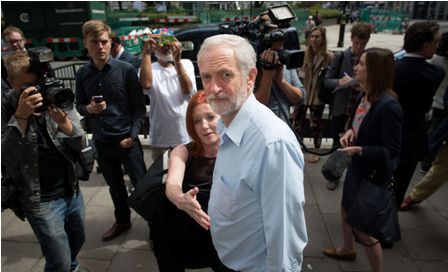Truly, one might have expected Britain’s pro-America faction to greet Corbyn’s victory with decorum due to their much-lauded respect for the will of the people – after all, Corbyn received 60% of the vote, while his closest contender came away with less than 20%. Alas!
The headline chosen by Bloomberg’s editorial board, “Britain’s Labour Party Chooses Death With Honor”, was typical of the sentiments expressed in Britain and the West in general. (Although there is a veiled threat within the title.) In essence it means that Britain’s Labour Party has taken leave of its senses and is hurtling toward death by choosing Corbyn.
The urge to renounce Jeremy Corbyn was shared by every influential voice in the British media and business circles, as well as civil servants, every supporter of a pro-America Great Britain, and finally Tony Blair himself (who might be forever known as “Bush’s poodle”).
It turns out that Corbyn is unacceptable to the Anglo-American establishment because he is a frequent guest on the TV channel Russia Today, and because he heads the Palestine Solidarity Campaign, and because he opposes the war in Iraq, and so on…
The mediamanaged to dig up some ‘dirt’ in his bio, with a report on his Aug. 11 interview with RT that claimed Corbyn “hinted that he would want to form a closer relationship between Britain and Russia.” And to top it all off, he has been branded as “Putin’s useful idiot in Europe,” all because of one relatively mild comment he made during the RT interview, a rhetorical question: “What is security? Is security the ability to bomb, maim, kill, destroy, or is security the ability to get on with other people and have some kind of respectful existence with them?”
“Russia’s support” has been cited as one of the factors behind Jeremy Corbyn’s stunning victory, but no one has been able to explain what such support would have entailed. This could be considered “putting a bad face on it,” because the losers seem to have made an agreement not to recognize or name the real reasons behind his win. And those reasons are that Corbyn has consistently criticized Blair’s policy, which essentially comes down to subservience to Washington. The new leader of the Labour Party insists that international policy must take into account Russia’s opinion, and recommends not pursuing the type of “regime change” that was carried out in Iraq and Libya and is currently being implemented in Syria.
Nor should we forget that Corbyn also received the votes (whether actual or hypothetical) of hundreds of thousands of refugees, because Tony Blair himself bears the responsibility for their flight to the UK and continental Europe, due to his close association with the destruction of Iraq and, therefore, with the inevitable emergence of the Islamic State.
Blair continues to preach in that vein today, just as he did before the vote to elect the leader of his party: “If Jeremy Corbyn becomes leader, the party won’t just face defeat but annihilation. Stop him before it’s too late! The Labour party is in danger more mortal today than at any point in the over 100 years of its existence. I say this as someone who led the party for 13 years and has been a member for more than 40.”
It is difficult to say whether Jeremy Corbyn expected to encounter such a scathing rejection of his views from his own party members.

Corbyn’s program includes nationalizing Britain’s privatized railways, imposing high income taxes on the rich, and increasing government spending, including for social needs. This is in addition to pulling out of NATO, possibly even out of the European Union, and forcing the Bank of England to take orders from the government… “Anti-Americanism is a prominent part of the mix [for Corbyn’s supporters],” Bloomberg cautions.
Of course, no one yet knows whether Corbyn’s deeds would actually live up to his words should Labour Party win the next parliamentary elections in the UK. The key point today is the fact that Jeremy Corbyn is Tony Blair’s fiercest opponent in the Labour camp. Possibly even his antagonist.
Previously, prior to the Blair era, the Labour Party stood in traditional opposition to the conservatives’ pro-America strategy. The nightmarish bond between Reagan and Thatcher led England into the 1982 war against Argentina, which they won after sinking the Argentine ship the General Belgrano (based on a tip from a US satellite). This was followed by an equally historic episode – Thatcher’s carefully contrived showcase for spotlighting Gorbachev, after which she contentedly rendered her verdict, assuring her partners in Washington, “I like Mr Gorbachev, we can do business together.”
And then the Labor Party won the election and Tony Blair took over as Prime Minister. The essence of the dramatic political U-turn he engineered consisted of the fact that, as the head of the Labour Party, he left Britain with no political alternative. Ever since he assumed leadership of the party, every Labour member looked like an American “poodle.”
Perhaps Jeremy Corbyn will be able to make a reverse maneuver and once again give the United Kingdom a genuine two-party political system. After all, there were decades in British political history during which the Labour Party took a stand against British conservatism as well as American imperialism: it seems that the new Labour leader is returning this half-forgotten expression back into the political lexicon of the modern era.









